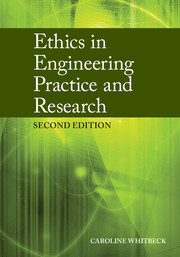Book contents
- Frontmatter
- Contents
- Note to Students
- Foreword to the First Edition
- Preface to the First Edition
- Acknowledgment
- Acknowledgments to the First Edition
- Part 1 Values and the Evaluation of Acts in Engineering
- Part 2 Engineering Responsibility
- 3 Ethics as Design ??? Doing Justice to Moral Problems
- 4 Central Professional Responsibilities of Engineers
- 5 Computers, Software, and Digital Information
- 6 Rights and Responsibilities Regarding Intellectual Property
- 7 Workplace Rights and Responsibilities
- Part 3 Responsible Research Conduct
- Part 4 The Future of Engineering
- References
- Index
- References
7 - Workplace Rights and Responsibilities
Published online by Cambridge University Press: 05 June 2012
- Frontmatter
- Contents
- Note to Students
- Foreword to the First Edition
- Preface to the First Edition
- Acknowledgment
- Acknowledgments to the First Edition
- Part 1 Values and the Evaluation of Acts in Engineering
- Part 2 Engineering Responsibility
- 3 Ethics as Design ??? Doing Justice to Moral Problems
- 4 Central Professional Responsibilities of Engineers
- 5 Computers, Software, and Digital Information
- 6 Rights and Responsibilities Regarding Intellectual Property
- 7 Workplace Rights and Responsibilities
- Part 3 Responsible Research Conduct
- Part 4 The Future of Engineering
- References
- Index
- References
Summary
As we saw in Chapter 3, it is in everyone's interest that engineers be heeded when they recognize risks and threats to the public welfare. It is in a client or employer's interest to see that engineers’ concerns are heard within their organization, so that no dangers or defects will be overlooked. Those organizations that disregard their engineers or even try to silence them, leaving them no alternative to “blowing the whistle” (i.e., going outside their organization to get attention to their concerns), lose the benefit of their engineers’ expertise and the respect of the public.
In prior chapters, we have focused on the moral skills that enable engineers to fulfill their responsibilities both in responsive and unresponsive organizations. In countries like the United States where employee engineers usually have no written employment contracts that protect engineers against retaliatory discharge, less reputable companies may retaliate against engineers for pursuing ethical concerns that clash with the company's short-term business objectives. Therefore, creating a workplace that is relatively free of the risk of such retaliation is a much larger ethical issue for engineering in a country like the United States than in countries where employee contracts are the norm.
- Type
- Chapter
- Information
- Ethics in Engineering Practice and Research , pp. 227 - 270Publisher: Cambridge University PressPrint publication year: 2011



